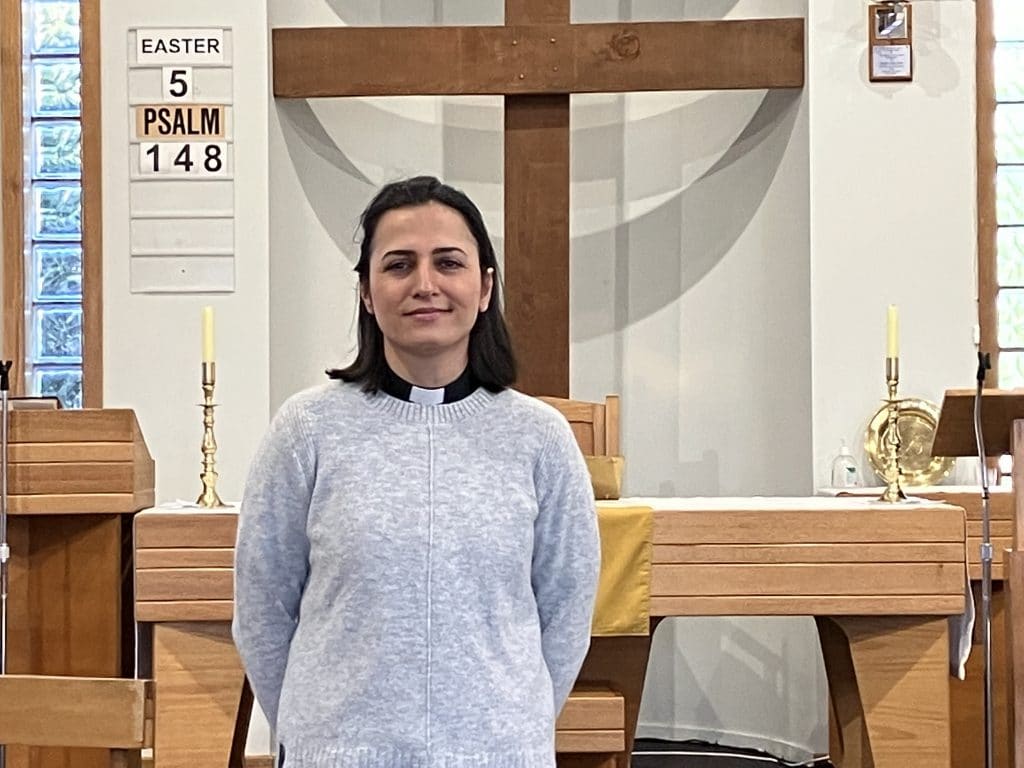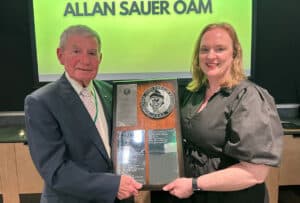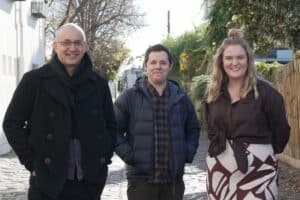
Jenan Taylor
19 May 2022
The Reverend Hoda Ameri was once a devout Muslim who would never have believed that she would make a difference in the lives of Iranian refugees and asylum seekers.
Life changed, however, when Ms Ameri four months pregnant, found herself starving, terrified and adrift at sea in a crowd of other asylum seekers. But then a light blazed in the dark and the Australian navy pulled up alongside their vessel.
For Ms Ameri, it was a sign that the Christian God, whom she and her husband had come to learn about during their flight from Iran, was the one true God.
They had travelled thousands of kilometres, but Ms Ameri believes that her journey really began the moment she had accepted Christ as her saviour.
Read more: Nearly a ‘runaway bride’ at her own ordination, this is Jill Firth’s story
Ordained as a deacon in February last year, Ms Ameri leads the Anglican Emmanuel Iranian churches in Dandenong and Keilor, along with her husband, the Reverend Kaveh Hassanzadeh.
There she has committed herself to helping other refugees and asylum seekers find courage in even the darkest times through placing their faith in God, as she had.
It was a road Ms Ameri could never have anticipated.
She had once been deeply knowledgeable of the Qur’an, was often able to recite from it, and had been observant of occasions such as Ramadan.
Indeed, in the Iran she had grown up in, people had little option to think about, talk about, or follow anything but Islam, Ms Ameri said.
“I came from a community where most of the people were struggling with pain, suffering, broken life, sadness and anger,” she said, “and although they have a good heart for God, and for each other, they suffer because they have lost the truth and the way, as I had.”
Attaining a degree in engineering, a feat for a woman in Iran, Ms Ameri had already gone against convention.
Read more: Emmanuel congregation stands with Farsi-speaking community
But when she married Mr Hassanzadeh, whose beliefs differed greatly from many others, it became clear that if they were ever to have a peaceful life together, they would have to leave.
While enroute to Australia the couple met an Iranian Christian family in Indonesia, and were drawn to the love and compassion they showed for those around them.
Through that friendship, Ms Ameri and Mr Hassanzadeh became interested in learning about God and were profoundly affected by the idea of drawing hope from Him. It was that new found faith that they clung to as their journey across the turbulent ocean continued.
When the couple finally arrived in Australia in 2012, they faced having to learn English, understand the community and find employment, a search Ms Ameri said that was particularly long for her.
Attending to their new spiritual life helped the couple, a great deal, she said. They went every week to churches in Sunshine, Berwick and other places before learning of the Anglican Iranian church that sat beside a busy road in Dandenong.
The encouragement of the then Oaktree Anglican church vicar Reverend Mark Durie, helped them to begin realising a life in ministry.
Read more: How Kathryn went from Christmas trips to her grandparents’ church to ordination
Eventually Ms Ameri started working, running a restaurant business, but her heart wasn’t in it. Her husband had begun his ministry at the Emmanuel Iranian church, and in 2013 Ms Ameri became a lay minister.
She had come to realise, she said, that what made her happiest, was supporting the asylum seeker parishioners at the church through their fears and troubles.
“They have many issues,” Ms Ameri said. “The temporary visa problem, although important, is just one issue.”
There is also the language barrier, the struggle to find secure work, being ostracised by others and for many, effects of their traumatic journeys by sea. Then there is the grinding loneliness of being separated from people they’d left behind, she said.
Ms Ameri particularly understood the eroded sense of self the women parishioners carried with them.
“In Iran they think women [have]to be at home, cooking, cleaning, looking after the kids and being a wife. That was the attitude of many Iranian men and therefore of society,” Ms Ameri said. The cultural norm made it almost impossible for women to secure employment and even if they did, it was a barrier to their participation in the workplace.
The situation she said often meant that women faced family violence along with a litany of other painful experiences.
Ms Ameri said she realised that in Australia where things were very different and men and women had equal rights, she could help her women parishioners. As a leader in the church, she could “make a real difference in the life of other women, to be a voice for them, and gender equality and spread awareness to break down barriers in my culture.”
Read more: Struggle continues despite 30 year milestone for women’s ordination
Despite having found her calling, Ms Ameri still wrestled with it. She remembers thinking that perhaps she was meant to help others by simply supporting her husband in his ministry. “It has taken me years to understand God’s plan for my life,” she said. “But it was the Holy Spirit who guide me to say yes to my calling and to do what pleases God.”
For Ms Ameri, the people who attend the church are now her spiritual family. She also believes that for them, in the absence of the loved ones and the life they left behind, the same is true.
“Many of them could not find themselves in this society, so the church is not just a church for them. We are like a family. It means a lot for them. Like a community,” Ms Ameri said. “Like a home.”
They held gatherings for the community sharing meals, and assistance with language, among other things. During the COVID lockdowns they also provided them with food and mental health support.
But what the Emmanuel Iranian parishioners loved the most when the lockdown finished, Ms Ameri said, was going camping.
“We are just a group of about 25 people with tents, and we gather we worship together, we read the Bible, and we have fun times playing football, basketball or some other activity. And being in nature has helped our congregation a lot,” she said.
Ms Ameri attends Ridley College and hopes to become an ordained priest in November. She wants to continue working alongside her husband towards full time Christian ministry among the Iranian believers and to serve in the Church in whatever capacity God decided was possible for them.
She also holds great hopes for the future of the Iranian people. “That they would have chance to know Jesus, not as a Muslim prophet, but as the Lord Jesus Christ. And that they would look for their hope in Him, experience the true hope, joy and peace and love of Christ, and follow Him, whatever it would cost.”
This profile of the Reverend Hoda Ameri is part of a series on women in ministry, marking the December 2022 anniversary of 30 years since women were ordained in the Anglican Diocese of Melbourne.
For more faith news, follow The Melbourne Anglican on Facebook, Twitter, or subscribe to our weekly emails.






